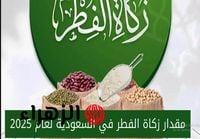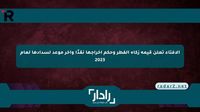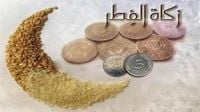As the holy month of Ramadan approaches its end, Muslims worldwide prepare for the observance of Zakat al-Fitr, a charitable contribution that holds significant importance in Islamic tradition. This year, Dar Al-Iftaa Al-Masryah has set the value of Zakat al-Fitr for 1446 AH at 35 Egyptian pounds per person, with the option for individuals to contribute more if they wish. This decision aims to facilitate the needs of the poor and ensure that the essence of Zakat is fulfilled, which is to provide assistance to those in need during the festive occasion of Eid al-Fitr.
The determination of Zakat al-Fitr is based on the staple food of the region, which, in Egypt, is primarily wheat. According to the Iftaa, the amount is equivalent to 2.5 kilograms of wheat, reflecting the basic dietary staple for the majority of Egyptians. This year’s calculation aligns with the opinion of Imam Abu Hanifa, who permits the payment of Zakat in cash rather than in kind, thereby enhancing the practical benefits for recipients.
Muslims are encouraged to fulfill their Zakat obligations during Ramadan, specifically from the beginning of the month until just before the Eid al-Fitr prayer. This timing ensures that the contributions reach those in need promptly, allowing them to partake in the joys of Eid. “Aiding them on this day” is a sentiment echoed in a hadith that emphasizes the importance of timely charitable giving.
While there are differing opinions among scholars regarding the timing of Zakat al-Fitr, the majority of Maliki, Shafi'i, and Hanbali schools advocate for its payment before sunset on the day of Eid. The Hanafi school, however, allows a broader timeframe but recommends payment before the prayer for maximum benefit.
Dar Al-Iftaa stresses the importance of expediting Zakat payments to prevent Muslims from missing out on achieving the humanitarian goals of this obligation. The Iftaa's guidance highlights that cash contributions can be particularly beneficial, as they allow recipients to purchase what they need most at the moment, rather than being limited to specific food items.
In Saudi Arabia, the Ministry of Awqaf has also announced its own estimates for Zakat al-Fitr for the year 1446 AH, setting the amount at approximately 3 kilograms of food per individual, with a cash equivalent ranging from 25 to 30 Saudi riyals. This reflects a similar approach to ensuring that the Zakat serves its purpose effectively, enabling the poor to celebrate Eid with joy.
As Muslims across the globe prepare to fulfill their Zakat al-Fitr obligations, it is essential to remember that this act of charity is not merely a financial transaction. It embodies the spirit of community, compassion, and social responsibility that Islam promotes. By adhering to the prescribed amounts and timings, individuals contribute to the welfare of society, reinforcing bonds among community members and ensuring that no one is left in need during the festive season.
Moreover, Zakat al-Fitr serves as a means of purifying the fasting person from any shortcomings during Ramadan. It is a reminder of the blessings one has received and an opportunity to share those blessings with others. The act of giving Zakat fosters a sense of gratitude and encourages a spirit of generosity among Muslims.
In conclusion, the timely and proper payment of Zakat al-Fitr is crucial for fulfilling this important religious duty. It not only aids those in need but also enhances the spiritual experience of the giver. As the Eid celebrations draw near, Muslims are urged to reflect on the significance of this practice and ensure that their contributions reach those who need them most, thus embodying the true essence of charity and community.







